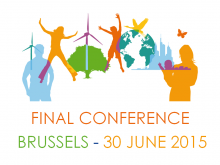With the adoption of the landmark Paris Agreement in December 2015, urging the international community to communicate “long-term low greenhouse gas emission development strategies,” the culmination of the CECILIA2050 research project could not be timelier. The eight-country research consortium was tasked with investigating how climate policy instruments interact, the factors that impact their performance and how these instruments should evolve to meet long-term climate goals. Thus, the foremost objective of the CECILIA2050 project was to identify an optimal—effective, efficient and feasible—instrument mix to steer the EU economy through its low-carbon transformation.
The CECILIA2050 research project came to a close at the end of 2015. Major highlights of the project’s final stages included a high-level conference in Brussels in summer 2015 as well as the publication of a three-volume synthesis report, which draws from the many project work strands to present strategic lines of instrumentation for the future of climate policy instrumentation in the EU, both in the short and the long term. The volume also addresses the gap between the ambition of long-term climate targets and the instruments currently in use to meet them.
The research undertaken serves to inform discussions that will occur in the coming months and years, as the groundwork for implementing the measures mandated by the Paris Agreement in the EU commences. One major take home message from the project is as follows: decisions made in short-term have lasting impacts on the optimality of climate policy in the long-term—these immediate choices may cause the EU to stumble on its climate commitments or chart a trajectory towards economy-wide decarbonisation and a low-carbon future.
Read the CECILIA2050 final conference report.
Read the three-volume CECILIA2050 synthesis report, Towards Optimal Short-, Medium- and Long-term Climate Policy Instrumentation.
Read the CECILIA2050 Policy Briefs.
View all CECILIA2050 research output and related publications here.


